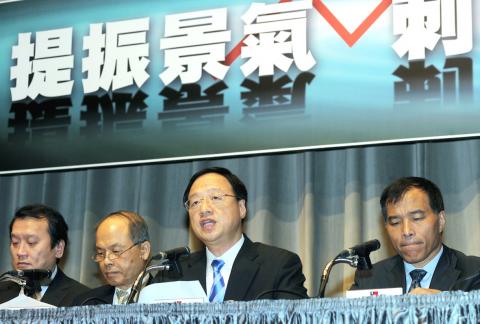The Executive Yuan yesterday unveiled a package of 13 measures to boost what Premier Jiang Yi-huah (江宜樺) has described as the nation’s “suffocated” economy to ensure that GDP growth reaches the government’s 3 percent growth target this year.
At a press conference to announce the package, Jiang said that the measures would “contribute positively toward GDP” by seeking to expand consumption, attract investment, encourage new businesses and revise the capital gains tax on securities investments.
Jiang would not specify how many percentage points the measures were aiming to add to GDP growth, saying it is difficult to make such predictions.

Photo: CNA
“Analysts have been forecasting a turnaround in the second half of this year and we will continue to take steps to strengthen the economy and attain 3 percent GDP growth,” Jiang said.
One of the measures involved the legislature passing an amendment to the Income Tax Act (所得稅法) before the current session ends on Friday to drop the 8,500-point threshold that automatically triggers the capital gains tax for individual investors, Jiang said.
The Chinese Nationalist Party (KMT) has proposed removing the requirement that the TAIEX surpass 8,500 points for the tax to be imposed and replace it with a tax on investors who sell NT$1 billion (US$33.3 million) worth of shares during one calendar year.
The premier said that abolishing the threshold would turn the economy around because it would be like “lifting the cover off a pot” to let the “suffocated” economy breathe.
Jiang said he has already spoken with Legislative Speaker Wang Jin-pyng (王金平) to say he hoped the legislature could push through the tax amendment by Friday instead of waiting for the planned extra session next month.
The tax, which was introduced in July last year, is generally perceived as “a major culprit behind the sluggishness of the economy in the first half of the year,” Jiang said.
However, Wang was pessimistic about the timeline.
Since opposition parties have expressed dissenting views about the KMT’s proposal, the amendment would be placed on the agenda for the extra legislative session, Wang said.
An extra session has been scheduled to run from June 13 to June 27 and the KMT has said it would push for a second extra session in late July if necessary.
KMT Legislator Lai Shyh-bao (賴士葆) said the tax amendment would be the most effective of the 13 measures boosting the economy and called on Jiang to discuss the issue with opposition leaders “instead of just making appeals via the media.”
The Directorate-General of Budget, Accounting and Statistics last week lowered its economic growth forecast for this year from its 3.59 percent projection made on Feb. 22 to 2.4 percent.
The Executive Yuan is to invest NT$3.24 billion to implement the 13 measures, some of which are to last for five years.

Right-wing political scientist Laura Fernandez on Sunday won Costa Rica’s presidential election by a landslide, after promising to crack down on rising violence linked to the cocaine trade. Fernandez’s nearest rival, economist Alvaro Ramos, conceded defeat as results showed the ruling party far exceeding the threshold of 40 percent needed to avoid a runoff. With 94 percent of polling stations counted, the political heir of outgoing Costa Rican President Rodrigo Chaves had captured 48.3 percent of the vote compared with Ramos’ 33.4 percent, the Supreme Electoral Tribunal said. As soon as the first results were announced, members of Fernandez’s Sovereign People’s Party

MORE RESPONSIBILITY: Draftees would be expected to fight alongside professional soldiers, likely requiring the transformation of some training brigades into combat units The armed forces are to start incorporating new conscripts into combined arms brigades this year to enhance combat readiness, the Executive Yuan’s latest policy report said. The new policy would affect Taiwanese men entering the military for their compulsory service, which was extended to one year under reforms by then-president Tsai Ing-wen (蔡英文) in 2022. The conscripts would be trained to operate machine guns, uncrewed aerial vehicles, anti-tank guided missile launchers and Stinger air defense systems, the report said, adding that the basic training would be lengthened to eight weeks. After basic training, conscripts would be sorted into infantry battalions that would take

GROWING AMBITIONS: The scale and tempo of the operations show that the Strait has become the core theater for China to expand its security interests, the report said Chinese military aircraft incursions around Taiwan have surged nearly 15-fold over the past five years, according to a report released yesterday by the Democratic Progressive Party’s (DPP) Department of China Affairs. Sorties in the Taiwan Strait were previously irregular, totaling 380 in 2020, but have since evolved into routine operations, the report showed. “This demonstrates that the Taiwan Strait has become both the starting point and testing ground for Beijing’s expansionist ambitions,” it said. Driven by military expansionism, China is systematically pursuing actions aimed at altering the regional “status quo,” the department said, adding that Taiwan represents the most critical link in China’s

‘REALLY PROUD’: Nvidia would not be possible without Taiwan, Huang said, adding that TSMC would be increasing its capacity by 100 percent Nvidia Corp CEO Jensen Huang (黃仁勳) on Saturday praised and lightly cajoled his major Taiwanese suppliers to produce more to help power strong demand for artificial intelligence (AI), capping a visit to the country of his birth, where he has been mobbed by adoring fans at every step. Speaking at an impromptu press conference in the rain outside a Taipei restaurant, where he had hosted suppliers for a “trillion-dollar dinner,” named after the market capitalization of those firms attending, Huang said this would be another good year for business. “TSMC needs to work very hard this year because I need a lot